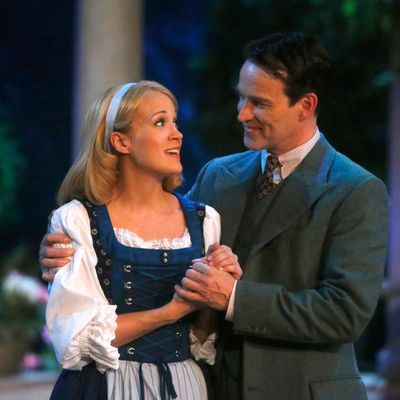
The hills were alive after all: NBC’s live staging of The Sound of Music, starring Carrie Underwood, turned out to be a ratings triumph for the Peacock. According to Nielsen, the three-hour musical event drew an estimated 18.5 million viewers and earned a 4.6 rating among those under 50. The Sound of Music Live was easily the most-watched show on TV last night (at least in same-day ratings); among younger viewers, SOML tied CBS’s The Big Bang Theory for first. Edel-wow! These numbers represent a big win for NBC Entertainment chief Robert Greenblatt, for whom Sound was the definition of a pet project. The exec, a former Broadway producer (9 to 5), was intimately involved in the production, so much so that he was front and center during portions of the making-of special NBC aired last week to promote last night’s broadcast. His interest wasn’t just a reflection of his Broadway roots, however; Greenblatt and other broadcast executives have realized that in the era of on-demand viewing, getting viewers to sit down in front of their TV screens for an original broadcast’s first airing will require more extraordinary efforts in the vein of Sound. “We need to be in the event business,” Greenblatt told reporters last July. With last night’s success, expect the networks to keep trying to make Must-See (It Now) TV.
This is not to suggest that NBC and its rivals will all start rushing out to do more live musicals. (Though if they do, plenty of folks on Twitter are already suggesting possibilities. Starlight Express Live, anyone?) Even though it worked, Sound of Music was always a bit of an out-there choice (particularly for the network that just lived through Smash). The point is that broadcasters have finally realized they need to work to get viewers’ attention in a way they didn’t even five years ago. Back in 2008, even the lowest-rated broadcast network (then NBC) could count on averaging at least 7 or 8 million same-day viewers. Last week, Fox couldn’t even muster 4 million. Nets have always tried to boost their numbers during sweeps periods with events or special episodes (the birth of Lucy and Ricky Ricardo’s son wasn’t designed to be just another episode of I Love Lucy). But now, such “events” are likely to pop up year-round, and much more regularly. While creating buzzworthy series is always going to be at the core of a network’s success (or lack thereof), events such as Sound of Music are a way to remind viewers that TV can be a communal experience and not just something you stream to your iPhone via Netflix six months later. They help networks stay relevant.
But NBC didn’t spend so much money and promotional effort on Sound of Music just to boost its self-esteem. It was looking to create a reason for viewers to watch Right Now because viewers who watch a show as it airs are much more valuable than those who check in on a show a few days later. As much as nets like to tout delayed viewing, the fact is that advertisers only care about viewers who actually watch commercials. It’s easy to skip ads on a DVR replay, and while some people still actually watch the ads (really!), a huge chunk of viewers don’t. The millions who watched (and snarked) about Sound of Music live last night were much more likely to be exposed to all those Wal-Mart commercials. The same goes for the millions who watch The Voice live every Monday, catch football on Sunday, or live-tweet each episode of Scandal. NBC’s SNL is an equally effective DVR-buster.
Even before the success of Sound of Music, there was plenty of evidence that networks — both broadcast and cable — were looking to event-ize their lineups. Last year’s blockbuster numbers for A&E’s miniseries Hatfields and McCoys may have been a turning point, demonstrating that the right property could draw viewers to watch live; History’s equally impressive Nielsen numbers this year for Mark Burnett’s The Bible only underscored the upside of ambitious efforts. Fox is now working on several so-called “event” series, including a stand-alone reboot of 24. NBC has also announced plans for several old-school miniseries, including a sequel to The Bible and a multi-night drama about Cleopatra. ABC is developing miniseries about slavery and the gay rights movement. CBS’s Under the Dome was also an attempt to create heat in the summer, even if the story line was always meant to be open-ended. It’s quite possible that many of these events will turn out to be, well, non-events. There will be failure. Indeed, NBC tried to make Million Second Quiz a big deal last September; it was a flop. But the inevitable stumbles shouldn’t deter the networks. Given how rapidly same-day ratings for their weekly series are shrinking, thinking big may be broadcast TV’s best hope for staying big.

